The Institute of Criminology and Criminology Justice annually sponsors and provides the opportunity for faculty and students to attend lectures given by a variety of guest speakers who focus on wide range of criminological topics.
Winter 2024 Colloquiums & Events:
There are no upcoming events scheduled at this time.
Past ICCJ Colloquiums:
- ICCJ Winter Colloquium March 27th: No More Deaths in Custody
-
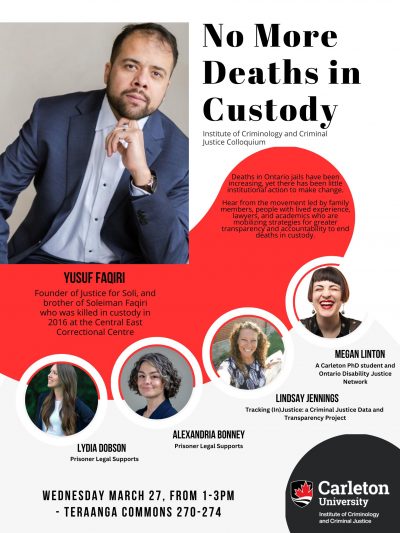 Deaths in Ontario jails have been increasing, yet there has been little institutional action to make change. Come and hear from those in the movement who are working to mobilize strategies for greater transparency and accountability to end deaths in custody.
Deaths in Ontario jails have been increasing, yet there has been little institutional action to make change. Come and hear from those in the movement who are working to mobilize strategies for greater transparency and accountability to end deaths in custody.
- ICCJ 25th Anniversary Celebration
-
The Institute of Criminology and Criminal Justice (ICCJ) celebrates 25 years of the BA programs in Criminology and our Institute with a festive sit-down brunch, during which we will screen a short video about the evolution of our Institute. We also showcase a humble oral history of the ICCJ, featuring interviews with alumni, current students, cross-appointed faculty members, as well as former ICCJ Directors.

- ICCJ Fall Colloquium Oct 17th: Justice and Security in Critical Criminology
-
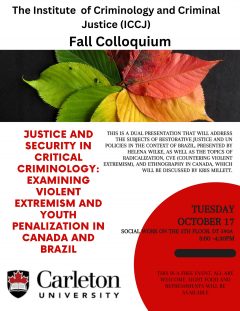 This is a dual presentation that will address the subjects of restorative justice and UN policies in the context of Brazil, presented by Helena Wilke, as well as the topics of radicalization, CVE (countering violent extremism), and ethnography in Canada, which will be discussed by Kristopher Millet.
This is a dual presentation that will address the subjects of restorative justice and UN policies in the context of Brazil, presented by Helena Wilke, as well as the topics of radicalization, CVE (countering violent extremism), and ethnography in Canada, which will be discussed by Kristopher Millet.
- March 9th, 2023: Questioning the Carceral: Prison Resistance and Indigenous Life
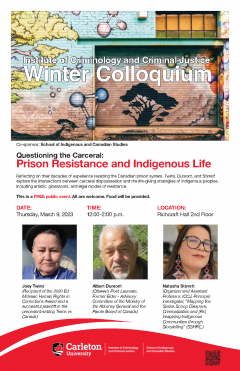
Reflecting on their decades of experience resisting the Canadian state and prison system, Twins, Dumont, and Stirrett explore the intersections between carceral dispossession and the life giving strategies of Indigenous peoples, including artistic, grass roots, and legal modes of resistance.
- February 2nd, 2023: The Effects of Defendant Race and Expert Testimony on Jurors’ Perceptions of Recanted Confessions: Preliminary Comparisons between Samples from Canada and the United States
-
This talk presents research that examines the interactive effects of defendant race and expert testimony on White jurors’ perceptions of recanted confessions. Preliminary results suggest evidence of a watchdog effect with American, but not Canadian, White mock jurors.
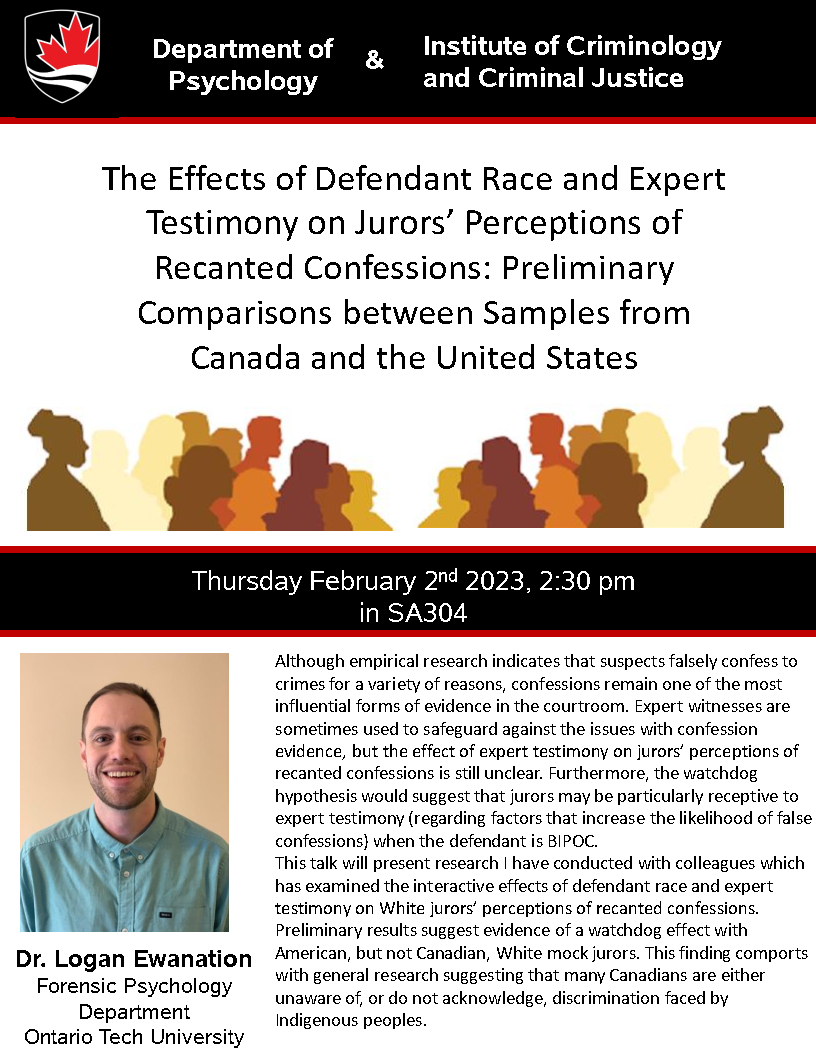
- November 28th, 2022: Modulating eventfulness, mitigating potentiality: Examining the political work of police liaison teams in Ontario
-
This talk adopts a critical geographic perspective on the relationship between space and event to discuss the proliferation of police liaison strategies and to examine the ways in which PLTs territorialize settler state power and subtly reconfigure the political terrain over which political dissent is organized.
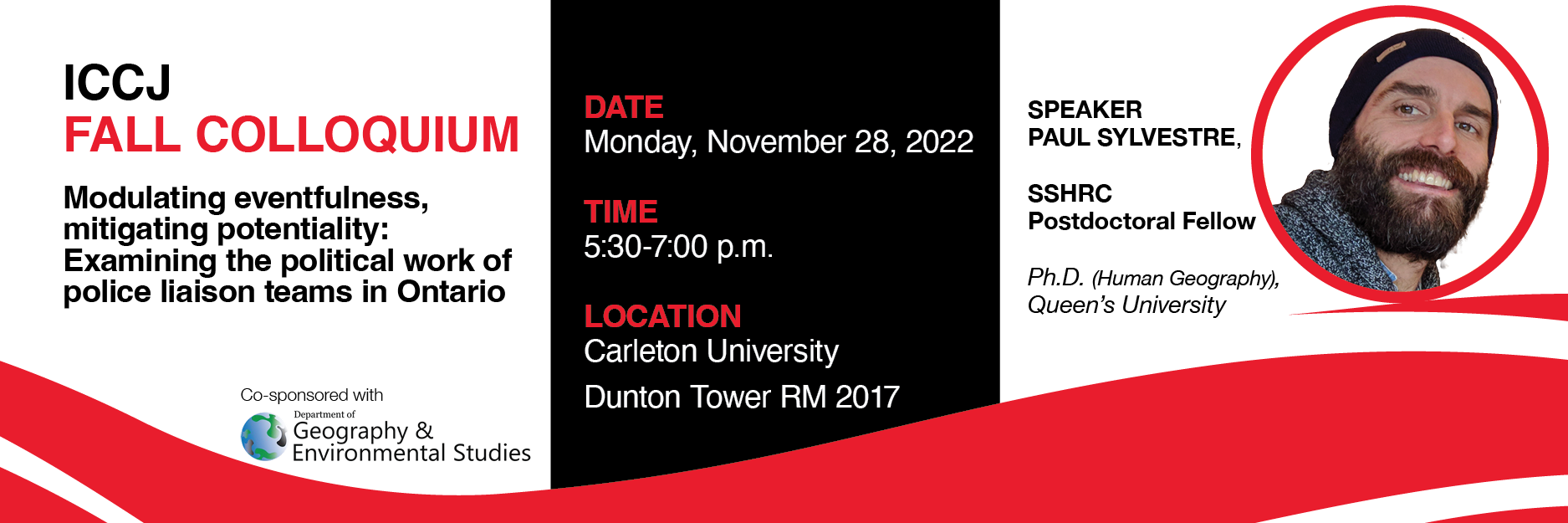
- March 10, 2022: The Little Old Lady Killer: The Sensationalized Crimes of Mexico’s First Female Serial Killer
-
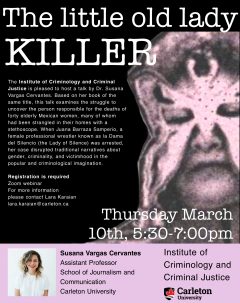 This talk examined Mexico City police’s struggle to find the person responsible for the deaths of forty elderly women, many of whom had been strangled in their homes with a stethoscope by someone posing as a government nurse.
This talk examined Mexico City police’s struggle to find the person responsible for the deaths of forty elderly women, many of whom had been strangled in their homes with a stethoscope by someone posing as a government nurse.
- November 2, 2021: Surveillance Crime/Surveillance Pleasure: Complexities of the Upskirt Photo
-
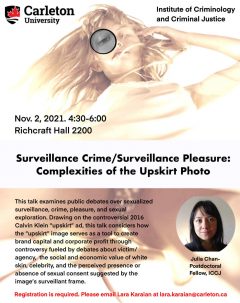 This talk examined public debates over sexualized surveillance, crime, pleasure, and sexual exploration. It took place in-person and featured Julia Chan, a Postdoctoral Fellow with ICCJ.
This talk examined public debates over sexualized surveillance, crime, pleasure, and sexual exploration. It took place in-person and featured Julia Chan, a Postdoctoral Fellow with ICCJ.
- October 7, 2020: The University and Carceral State
-
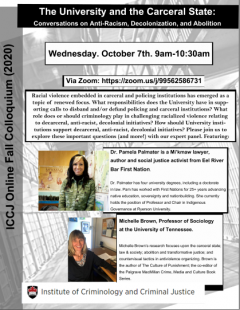 Racial violence embedded in carceral and policing institutions has emerged as a topic of renewed focus. What responsibilities does the University have in supporting calls to disband and/or defund policing and carceral institutions? What role does or should criminology play in challenging racialized violence relating to decarceral, anti-racist, decolonial initiatives? How should University institutions support decarceral, anti-racist, decolonial initiatives? Explore these important questions (and more!) with our expert panel (video recording).
Racial violence embedded in carceral and policing institutions has emerged as a topic of renewed focus. What responsibilities does the University have in supporting calls to disband and/or defund policing and carceral institutions? What role does or should criminology play in challenging racialized violence relating to decarceral, anti-racist, decolonial initiatives? How should University institutions support decarceral, anti-racist, decolonial initiatives? Explore these important questions (and more!) with our expert panel (video recording).Featuring renowned Indigenous Academic and Activist Pam Palmater and Criminologist Michelle Brown
- March 9, 2020: Far-Right, Post-Truth: Language and Limits in Contemporary Politics
-
An iteration of the ICCJ Colloquium series organized in
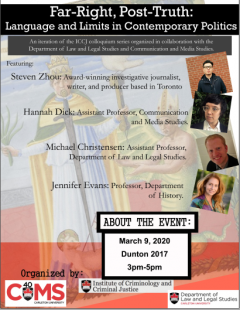 collaboration with the Departments of Law and Legal Studies and Communication and Media Studies.
collaboration with the Departments of Law and Legal Studies and Communication and Media Studies.
- October 17, 2019: Human Rights, Mental Health, & Federal Corrections
-
Dr. Ivan Zinger
Correctional Investigator of CanadaDr. Zinger will present on the topic of Human Rights,
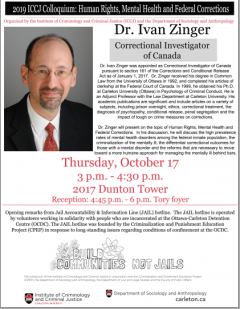 Mental Health and Federal Corrections. In his discussion, he will discuss the high prevalence rates of mental health disorders among the federal inmate population, the criminalization of the mentally ill, the differential correctional outcomes for those with a mental disorder and the reforms that are necessary to move toward a more humane approach for managing the mentally ill behind bars.
Mental Health and Federal Corrections. In his discussion, he will discuss the high prevalence rates of mental health disorders among the federal inmate population, the criminalization of the mentally ill, the differential correctional outcomes for those with a mental disorder and the reforms that are necessary to move toward a more humane approach for managing the mentally ill behind bars.Fall colloquium of the Institute of Criminology and Criminal Justice (ICCJ) in conjunction with the Criminalization and Punishment Education Project (CPEP), the Department of Sociology and Anthropology, the Department of Law and Legal Studies, and the Faculty of Public Affairs.
- April 10, 2019: Hybrid Threats and Hybrid Truth: Towards a Criminology of Dark Disorder
-
Dr. Willem de Lint
Amongst governments, there is a growing
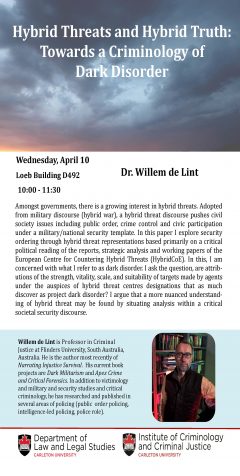 interest in hybrid threats. Adopted from military discourse (hybrid war), a hybrid threat discourse pushes civil society issues including public order, crime control and civic participation under a military/national security template. In this paper I explore security ordering through hybrid threat representations based primarily on a critical political reading of the reports, strategic analysis and working papers of the European Centre for Countering Hybrid Threats (HybridCoE). In this, I am concerned with what I refer to as dark disorder. I ask the question, are attributions of the strength, vitality, scale, and suitability of targets made by agents under the auspices of hybrid threat centres designations that as much discover as project dark disorder? I argue that a more nuanced understand-ing of hybrid threat may be found by situating analysis within a critical societal security discourse.
interest in hybrid threats. Adopted from military discourse (hybrid war), a hybrid threat discourse pushes civil society issues including public order, crime control and civic participation under a military/national security template. In this paper I explore security ordering through hybrid threat representations based primarily on a critical political reading of the reports, strategic analysis and working papers of the European Centre for Countering Hybrid Threats (HybridCoE). In this, I am concerned with what I refer to as dark disorder. I ask the question, are attributions of the strength, vitality, scale, and suitability of targets made by agents under the auspices of hybrid threat centres designations that as much discover as project dark disorder? I argue that a more nuanced understand-ing of hybrid threat may be found by situating analysis within a critical societal security discourse.
- November 5, 2018: Punishment and Legal Activism: Contesting Derek Twyman’s 160 – year US prison sentence
-
Derek Twyman, a Canadian citizen, was 25 years-old when he was sentenced to
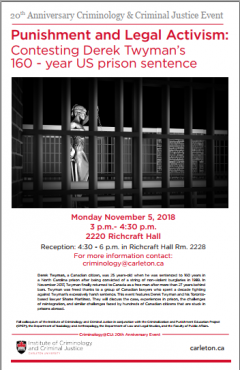 160 years in a North Carolina prison after being convicted of a string of non-violent burglaries in 1989. In November 2017, Twyman finally returned to Canada as a free man after more than 27 years behind bars. Twyman was freed thanks to a group of Canadian lawyers who spent a decade fighting against Twyman’s excessively harsh sentence. This event features Derek Twyman and his Toronto-based lawyer Shane Martinez. They will discuss the case, experiences in prison, the challenges of reintegration, and similar challenges faced by hundreds of Canadian citizens that are stuck in prisons abroad.
160 years in a North Carolina prison after being convicted of a string of non-violent burglaries in 1989. In November 2017, Twyman finally returned to Canada as a free man after more than 27 years behind bars. Twyman was freed thanks to a group of Canadian lawyers who spent a decade fighting against Twyman’s excessively harsh sentence. This event features Derek Twyman and his Toronto-based lawyer Shane Martinez. They will discuss the case, experiences in prison, the challenges of reintegration, and similar challenges faced by hundreds of Canadian citizens that are stuck in prisons abroad.Fall colloquium of the Institute of Criminology and Criminal Justice in conjunction with the Criminalization and Punishment Education Project (CPEP), the Department of Sociology and Anthropology, the Department of Law and Legal Studies, and the Faculty of Public Affairs.
- November 2, 2017: From Epidemic to Crisis: Contesting the Drug War Imaginary
-
Featuring Travis Linnemann and Marilou Gagnon.
Co-sponsored by the Institute of Criminology and Criminal Justice,
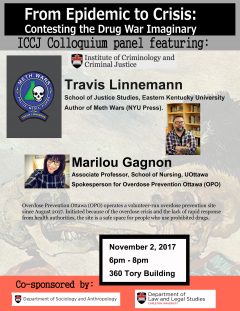 the Department of Sociology and Anthropology, and the Department of Law and Legal Studies.
the Department of Sociology and Anthropology, and the Department of Law and Legal Studies.
- February 28, 2017: Uninhibited Violence: The Racial Dimension of Securitization
-
David Moffette
Assistant Professor
University of Ottawa, Department of Criminology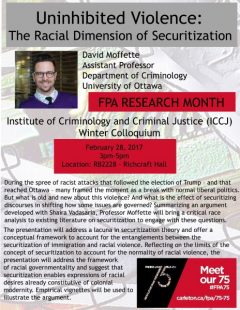
During the spree of racist attacks that followed the election of Trump – and that reached Ottawa – many framed the moment as a break with normal liberal politics. But what is old and new about this violence? And what is the effect of securitizing discourses in shifting how some issues are governed? Summarizing an argument developed with Shaira Vadasaria, Professor Moffette will bring a critical race analysis to existing literature on securitization to engage with these questions. The presentation will address a lacuna in securitization theory and offer a conceptual framework to account for the entanglements between the securitization of immigration and racial violence. Reflecting on the limits of the concept of securitization to account for the normality of racial violence, the presentation will address the framework of racial governmentality and suggest that securitization enables expressions of racial desires already constitutive of colonial modernity. Empirical vignettes will be used to illustrate the argument.